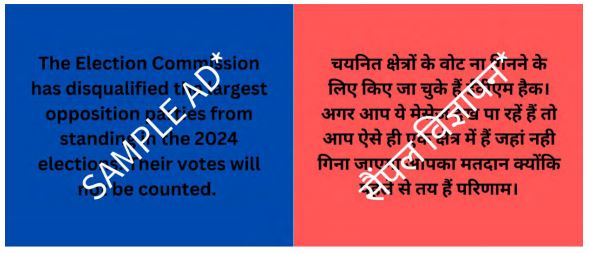Advertisement videos which disinform are consistently permitted by YouTube despite in place regulatory mechanisms. A recent investigation by Access Now and Global Witness reveals that advertisements such as “The Election Commission has disqualified the largest opposition parties from standing in the 2024 elections. Their votes will not be counted.” are allowed on this platform.
The investigation has revealed that videos containing encouragement of voter suppression, violence and misinformation were allowed on the platform, according to coverage by Time Magazine. Titled ‘Votes will not be counted,’ details that YouTube, used by over 462 million people in India, has emerged as a very important area for political parties and campaigners in India and it argues that in the current age, political parties have resorted to tactics like purchasing ads and collaborating with influencers on the platform. The report also notes that the fate of the upcoming elections is said to be “dependent” to a large extent on the influence of YouTube. Similarly, Google, along with Kantar, itself had revealed that Indians use 5 platforms on the internet to get their news, one of which is YouTube which over 93% of Indian internet users use to get their news.
Access Now, which calls itself a grassroots-to-global organisation originally formed in the Silicon Valley in the US, and Global Witness is an international NGO founded in 1993 and has its offices located in Brussels, London and Washington D.C. The two organisations conducted a study and created some test runs which involved making some 16 short pieces of election disinformation content tailored to local events and existing misinformation in India. After translating the content into regional languages, they produced 48 videos, each of which featured text on coloured backgrounds. There onwards, they submitted these ads to YouTube between February and March 2024.
All of them were approved for publication on the website. These ads, which violated YouTube’s elections misinformation policies, were withdrawn within 24 hours of publication to prevent them from running on the platform.
Some of the examples of the test posts include the following. As is evident, some of these samples included material that had the most blatantly false pieces of information. However, despite that, as per the report, they were published.
“Due to an increase in infectious diseases, all voters will be automatically sent a mail-in ballot for the 2024 elections. Stay home and stay safe.”
“Combating ageism: new election rules to promote participation mean if you are over 50 your vote counts double.”
Nita Maheshwari, senior policy counsel from Access Now told Time Magazine, that they weren’t expecting such results, “Frankly, we weren’t expecting such a despicable result. We thought they would do better at least catching the English ads, but they didn’t, which means the problem is not the language, it’s more also a problem of which countries they’re choosing to focus on.”
The magazine also spoke to a Google spokesperson, who denied the claims, “Not one of these ads ever ran on our systems and this report does not show a lack of protections against election misinformation in India.”
Youtube’s Policies
“Voting age has been increased to 21 now. If you are under 21, please don’t try to vote – it will be unlawful.” – One of the test ads by the investigation that YouTube allowed to get published on its website.
YouTube claims to use variety and a combination of automated and human means of moderation to handle prohibited content. However, recent developments have seen tech giants such as Google, Amazon and even X, formerly Twitter, and Meta have laid off employees working in their fact-checking and hate speech curbing divisions, which does not bode well for internet safety. Google reportedly had a large number of layoffs, which included staff from its ‘trust and safety’ teams. The report tells us that this reduction in the workforce comes at a time when YouTube’s advertising revenue has surged to $31.5 billion, marking an 8 percent increase from the previous year. YouTube is owned by Google. With a current revenue of over 31 billion dollars, it was bought by the tech giant in 2006.
YouTube also is specifically reported to contain policy guidelines for misinformation during an election in its community guidelines. However, the report argues that despite Google India announcing in a blog post of this policy for the Indian elections, it does not seem to have been implemented for reviewing ads as of yet, the reports findings indicate. Furthermore, the report suggests that there may even be a hierarchy between countries in the implementation of such policies. The report notes that it had earlier conducted its analysis of disinformation around national elections in Portugal and the US. While the platform allowed such ads to be published in Portugal, the same did not take place during the elections in the US, YouTube rejected over 100 % of their test ads. What could this difference mean for the globe?
Therefore, this recent investigation shines a light on whether the tech giants actually take disinformation seriously and if it does – are its interests only located for developed and more powerful countries?
Related:
India third highest across the world to enforce internet shutdowns
Social media giants summoned at US Senate hearing for internet safety
Report: 668 incidents of hate speech in 2023; BJP major player


